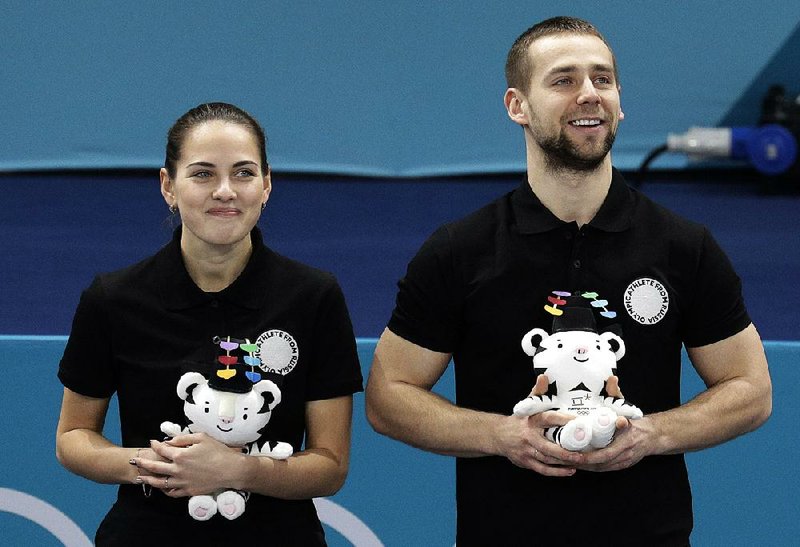PYEONGCHANG, South Korea -- Russia could lose its chance to be reinstated before the end of the Winter Olympics because of a doping charge against curling bronze medalist Alexander Krushelnitsky.
The Court of Arbitration for Sport said in a statement Monday that it has "initiated a procedure involving" Krushelnitsky, who finished third in mixed doubles with his wife, Anastasia Bryzgalova.
Russian officials said he tested positive for meldonium, which was banned in 2016, and has left the Olympic village. No date has been set for a hearing.
IOC spokesman Mark Adams said a failed doping test could keep Russia's banned team from marching under the national flag at the closing ceremony.
Russian athletes are participating in the Pyeongchang Olympics as "Olympic Athletes from Russia." The IOC suspended the Russian Olympic committee last year in connection with a doping scheme at the 2014 Olympics in Sochi but allowed 168 athletes to compete under neutral uniforms and without the Russian national flag.
Adams confirmed the positive test and said it could have "consequences" in evaluating the behavior the Russian team, which was required to abide by restrictions -- including bans to some medal favorites -- and to undergo extra drug tests.
"If confirmed, this will be taken into account along with many other factors" regarding Russian behavior, Adams said.
Russian Curling Federation president Dmitry Svishchev told The Associated Press that Krushelnitsky tested clean as recently as Jan. 22, the day before he flew to a pre-Olympic training camp in Japan.
Svishchev said it was possible someone spiked Krushelnitsky's food or drink. He suggested that rival Russian athletes or Russia's political enemies could be responsible.
"It can't happen at the Olympic Village because everyone eats the same canteen food," he said. "It could happen at training camp or in the intervening period. There's a possibility of it being something within the team, that something happened during training camp, or as a political means to achieve some goal."
The curling team trained in Japan in January, bringing in some Russian athletes who had not qualified for the Olympics as practice partners.
The federation senior vice president Andrei Sozin confirmed to the AP that Krushelnitsky tested positive for meldonium.
"Alexander has left the Olympic village and given up his accreditation," Sozin said. "We have information from our sources that the substance found was meldonium, which has not been used by Russian athletes and teams since 2015."
Meldonium is the substance that Russian tennis star Maria Sharapova was suspended for after testing positive at the Australian Open in 2016. Before it was banned, many Russian athletes used the drug, which is designed for people with heart problems and some believe can help athletes increase stamina.
Krushelnitsky's "A sample" tested positive. Adams said a second sample would be tested, and results could be announced within 24 hours.
The Norwegian team finished fourth and could get the bronze if the positive test is confirmed.
Adams said Russians at the games have undergone "rigorous testing" and adds that "Russians were tested to a significant level more than others."
The case was the talk of the rink at curling.
Russian women's curling coach Sergei Belanov said he didn't believe that a young and "clever man" would dope.
"It's stupid," he said. "But Alexander is not stupid, so I don't believe it."
The skip of the Russian women's team, Viktoria Moiseeva, wanted to comfort Krushelnitsky and Bryzgalova but "we thought that there are no words to comfort now. We just tried to stay away."
Though to the uninitiated, the idea of a curler using performance-enhancing drugs may seem bizarre, the sport does demand a high level of athleticism at the Olympic level. Curlers need to have strong core muscles and upper body strength to manage the often rigorous sweeping that helps them guide the rock down the ice.
Sports on 02/20/2018
